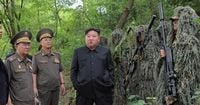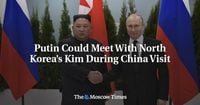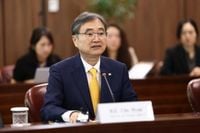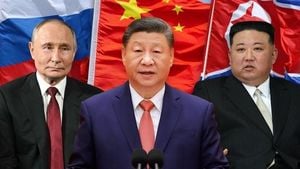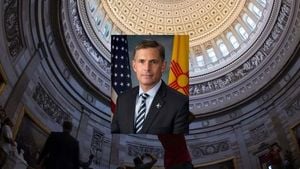North Korean leader Kim Jong Un is set to make his first visit to China in six years, marking a rare and highly significant foray onto the global stage. Next week, Kim will join Chinese President Xi Jinping and Russian President Vladimir Putin in Beijing for a grand military parade commemorating the 80th anniversary of the end of World War II—an event known as Victory Day in China. The parade, scheduled for September 3, 2025, is expected to be the largest multilateral diplomatic gathering Kim has ever attended, with around 26 foreign heads of state and government present.
Kim’s attendance is notable not just for its diplomatic symbolism but also for what it reveals about shifting alliances and strategies in Northeast Asia. According to Yonhap, South Korean Foreign Minister Cho Hyun underscored the importance of Kim’s participation, stating, “The announcement on Kim attending China’s Victory Day should closely be watched.” He added that this event marks the first time the North Korean leader will join other world leaders on such a multilateral stage, fueling speculation about a possible three-way summit with Xi and Putin.
China, North Korea’s longtime ally and principal economic partner, has extended the invitation to Kim, as confirmed by North Korea’s state-run Korean Central News Agency (KCNA). The parade will take place in Beijing’s iconic Tiananmen Square, where President Xi is expected to review tens of thousands of People’s Liberation Army troops showcasing some of China’s most advanced weaponry. Notably absent will be leaders from the United States and other major Western countries, a reflection of ongoing tensions—particularly over Russia’s war in Ukraine and the international community’s response to North Korea’s nuclear ambitions.
Kim’s travel itinerary has always been a subject of intense scrutiny. Since assuming power in 2011, Kim has rarely ventured beyond North Korea’s borders. His few overseas trips have been strategically significant: meetings with Xi in China in 2018 and 2019, two summits with then-U.S. President Donald Trump in Singapore (2018) and Vietnam (2019), and a much-anticipated summit with Putin in Vladivostok in April 2019. Most recently, in September 2023, Kim traveled by train to meet Putin at a Russian space facility, underscoring his growing rapport with Moscow.
According to Reuters, this Beijing parade represents “the biggest multilateral diplomatic event Kim has attended,” offering him a rare opportunity to interact with a diverse array of world leaders, including Vietnam’s Communist Party chief. Yang Moo-jin, president of the University of North Korean Studies in Seoul, observed, “It is quite unusual for Kim to attend a Victory Day ceremony, and it may be the first time Kim is attending a gathering of many heads of state, where he can meet Putin, Xi, and Vietnam’s Communist Party chief at once.”
Kim’s presence in Beijing is not merely ceremonial. Analysts suggest that North Korea, China, and Russia may use the occasion to demonstrate a united front in response to the growing cooperation among South Korea, Japan, and the United States. The parade is also seen as part of a broader effort by China and Russia to challenge Western narratives of World War II, with experts from the Brookings Institution describing it as a “memory war” designed to promote their own historical perspectives.
The geopolitical stakes are high. North Korea remains under heavy international sanctions for its nuclear weapons and ballistic missile programs, imposed in violation of U.N. Security Council resolutions. Yet, as Reuters notes, these sanctions have lost much of their bite in recent years, as Pyongyang has received increasing economic, military, and political support from both Russia and China. In fact, Kim has sent an unprecedented number of armaments and troops to aid Russia in its ongoing conflict with Ukraine, a move that has further deepened ties between Pyongyang and Moscow.
China’s Assistant Minister of Foreign Affairs, Hong Lei, emphasized the enduring bond between Beijing and Pyongyang, telling reporters, “We warmly welcome General Secretary Kim Jong Un to China to attend the commemorative events… Upholding, consolidating, and developing the traditional friendship between China and the DPRK is a firm position of the Communist Party of China and the Chinese government.”
While the parade will be attended by leaders from Belarus, Cuba, Pakistan, and Slovakia’s Prime Minister Robert Fico, the absence of major Western officials is striking. This exclusion is widely viewed as a direct consequence of the West’s opposition to Russia’s actions in Ukraine and its broader disagreements with both Moscow and Pyongyang. According to Newsweek, U.S. officials have grown increasingly concerned about what they see as North Korea’s efforts to bolster its combat capabilities and strengthen its international partnerships. The U.S. Office for the Direction of National Intelligence described North Korea in its annual threat assessment as being “in its strongest strategic position in decades, possessing the military means to hold at risk U.S. forces and U.S. allies in Northeast Asia, while continuing to improve its capability to threaten the U.S. Homeland.”
For South Korea, Kim’s attendance in Beijing presents both risks and opportunities. Foreign Minister Cho Hyun has reiterated Seoul’s commitment to bringing Pyongyang back to the dialogue table, with the ultimate goal of denuclearization. “We have to keep putting in effort so North Korea can come to dialogue... to ultimately achieve North Korea’s denuclearisation,” Cho stated. South Korea’s parliament speaker, Woo Won-shik, is also expected to attend the parade, although no meetings with North Korean officials have been scheduled thus far.
On a parallel track, South Korea and the United States are engaged in talks to revise their 1974 nuclear energy pact, which currently restricts Seoul’s ability to reprocess spent nuclear fuel and enrich uranium for peaceful purposes. Cho called the ongoing discussions “very meaningful,” highlighting the need for South Korea to have greater autonomy in producing fuel for its nuclear power plants—while also acknowledging U.S. concerns over nuclear proliferation.
As the world watches Beijing, the parade will serve not only as a showcase of military might but also as a barometer of shifting alliances and unresolved tensions on the Korean Peninsula. With Kim Jong Un stepping onto a multilateral stage alongside Xi Jinping and Vladimir Putin, the event underscores both the challenges and the possibilities that lie ahead for diplomacy in Northeast Asia.
For now, all eyes are on Beijing, where history, politics, and power will converge in a spectacle that may shape the region’s future in ways both subtle and profound.
